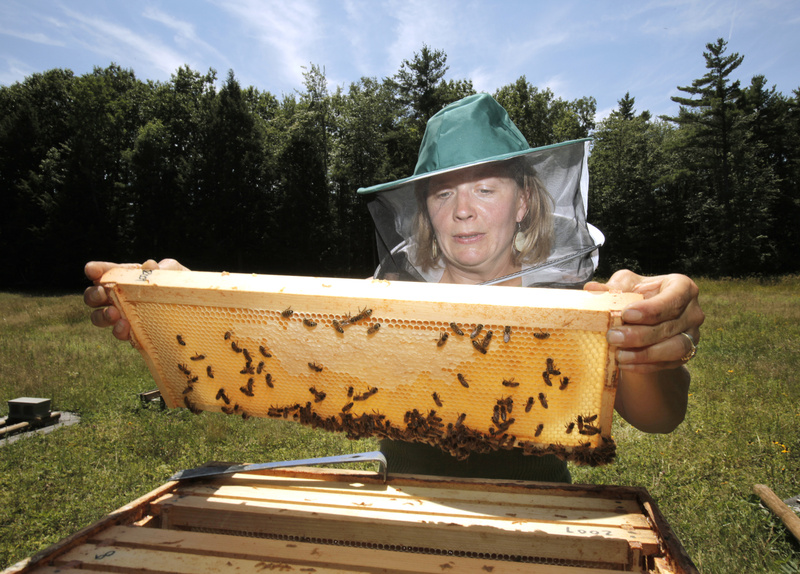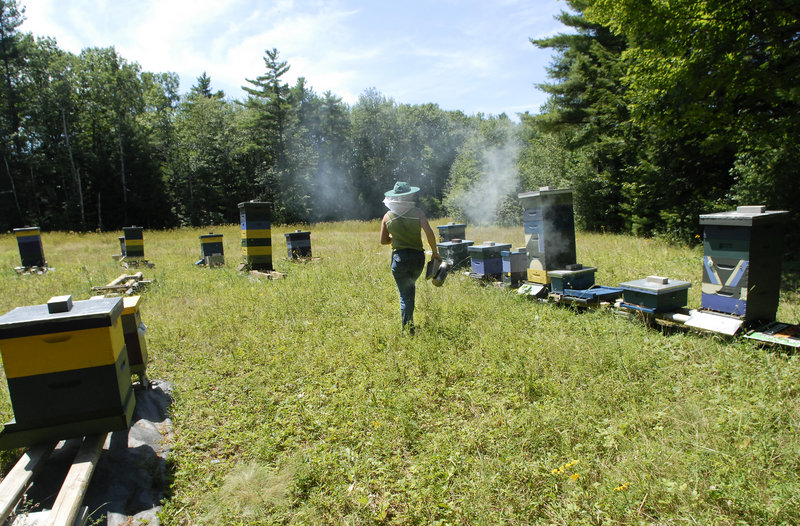FALMOUTH – The stacks of honeybee hives in a field off Woodville Road were buzzing with insects delivering pollen and nectar collected from nearby fields of clover and goldenrod as master beekeeper Erin Forbes checked the frames Tuesday.
Forbes pulled out a frame heavy with light golden honey, which she will harvest in another couple of weeks.
“The honey season is fantastic,” said Forbes, one of only four master beekeepers in Maine.
She and other beekeepers across the state report this year is particularly sweet with almost perfect conditions. A mild winter, an early growing season and a perfect balance of sun and rain have combined to make what experts say will be one of the best honey seasons in years.
Tony Jadczak, the state’s bee inspector, said Maine’s average honeybee hive yields about 32 to 35 pounds of harvestable honey annually. This year, he expects beekeepers could average 100 to 200 pounds, depending on their locations. He said the beekeepers are practically chortling with glee when they give him reports.
“It is an exceptional year,” Jadczak said.
Beekeepers say it is about time they got a break from several years of rainy, cool weather conditions and an ongoing threat from parasitic mites.
Last year Maine produced about 300,000 pounds of honey worth about $558,000, according to the National Agricultural Statistics Service at the U.S. Department of Agriculture. That is a tiny fraction of the 144 million pounds worth $208 million produced by U.S. beekeepers last year.
Maine has about a dozen commercial honey producers and about 1,000 backyard hobbyists. More than 400 of them are members of the Maine State Beekeepers Association.
Jadczak said he has received a number of calls from Cape Elizabeth and South Portland residents this year worried about swarming hives. He said that is probably related more to the growth of beekeeping as a hobby and more inexperienced beekeepers than to weather conditions.
Jadczak said the bees will swarm when their hives run out of storage space for their honey, with half the hive taking off with the old queen for a new space, which often turns out to be the side of a house. Experienced beekeepers are better able to estimate when it is time to enlarge a hive’s quarters.
Jadczak said this summer’s hazy, humid weather is causing flowers to secrete a lot of nectar.
“It has been a phenomenal clover bloom. The fields are filled with color,” said Jadczak.
He said the basswood trees, also known as lindens, in southern Maine also bloomed heavily, and the loosestrife, goldenrod and knotweed, also known as Mexican bamboo, which produce a high-quality honey, are flowering several weeks early.
Bees make honey by introducing an enzyme into the nectar, which they then excrete into the honeycomb cells while fanning it with their wings, thereby lowering the water content.
A single bee, which lives about 45 days, produces about a quarter-teaspoon of honey in a lifetime.
Forbes, the controller at Allagash Brewing Co., started her Overland Apiaries eight years ago, taking over a hobby that her husband started. Today she is the president of the state beekeepers association and owns 70 hives in Falmouth and Portland.
Each hive holds about 60,000 bees at the peak of the season, which means she presides over about 4.2 million bees. She said she is not worried about a glut of honey because of the ideal conditions.
“There is a huge demand for local honey,” Forbes said.
She always sells out her product, which costs $5 to $6 a pound at Portland-area stores where it is sold, more than twice the price of bulk honey sold in supermarkets.
But not every beekeeper is cheering.
Larry Peiffer, who keeps 35 hives in Standish and Hollis, said with everything blooming ahead of schedule, he is worried about a dearth of blossoms in the fall. And with everything blooming at once, honeybees are missing out on some flower species.
“Honeybees tend to get fixated,” he said.
Staff Writer Beth Quimby can be contacted at 791-6363 or at:
bquimby@pressherald.com
Send questions/comments to the editors.





Comments are no longer available on this story